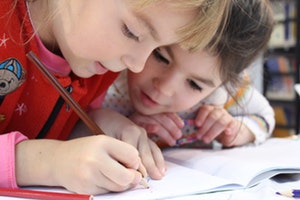Eureka! Children as young as five ‘get’ abstract science concepts
05 May 2019

Young children can understand abstract scientific concepts through guided experiments according to new research.
The findings of a paper published in Early Childhood Education Journal revealed that five and six year olds that took part in a teacher-led experiment were able to understand the concept of change in state of water between gas, liquid and solid.
The research, conducted in Greece in a pre-school environment tested whether a targeted intervention could work alongside other models of learning such as play to extend scientific understanding.
Dr Maria Danos, a Lecturer in Early Childhood Education and Care at the University of Reading who led the study said:
“It’s counterintuitive to think that an abstract concept can be taught at such an early age, but our trials in a class exceeded our expectations.
“Not only were the children who watched and discussed the experiment able to develop a conceptual model about state of water, they did it in a child-centre approach. It’s important to note that the teacher didn’t explain and elicit a parroted response, but asked questions that helped the five and six year olds to come to their own answers.”
To look at whether pre-school children could develop a conceptual model, a teacher led an experiment in which ice was heated up to form water vapour, then cooled on a cold plate to form water droplets. Throughout the process, the teacher guided the class to explain what they saw and understood through the experiment, and the paper records that the majority of children were able to provide an explanation of the conceptual idea of changing state of water with heat.
Dr Danos said:
“The findings provide further evidence for calls to rebalance early year curricula to teach a broader range of topics including ‘science’ in a way that gets to grips with concepts rather than just information.
“With misconceptions about science sometimes developed at an early age, it’s also critical to look at ensuring that we’re not placing barriers in the way of children’s enjoyment of learning science by introducing fundamental concepts at an earlier age.
“At a point where there are increasing calls for more people going into STEM careers, we need to ensure that we aren’t underestimating the ability of younger children to grapple with scientific concepts. It’s also important to stress that any new teaching about science should not replace children’s learning through play.”
Full citation: Kambouri-Danos, M., Ravanis, K., Jameau, A. et al. Early Childhood Educ J (2019). https://doi.org/10.1007/s10643-019-00937-5
